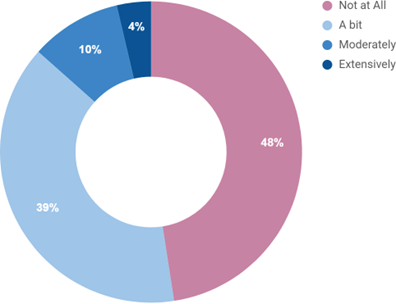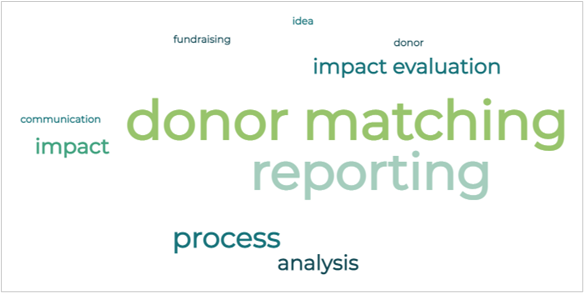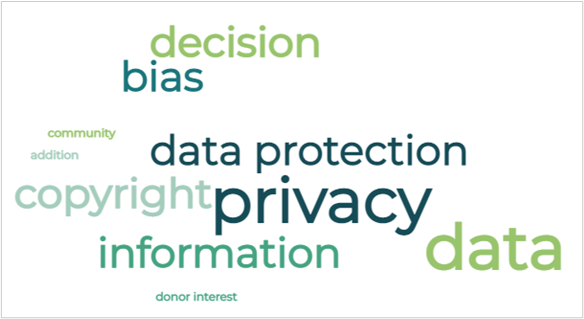
Current and Potential AI use in Swiss Philanthropic Organizations – Survey Results
Digital philanthropy is a rapidly evolving field transforming the way we think about charitable giving, social impact, and digital technologies. It analyzes if and how philanthropic organizations (POs) adopt digital technologies, discussing the potential benefits of these technologies for POs, and addressing the obstacles preventing POs’ employment of digital technologies. Preliminary data analysis on Swiss POs’ digitalization reveals substantial variation in their use of digital tools.
Whilst a few organizations are incorporating forefront technologies such as artificial intelligence (AI) in their operations, the majority of these organizations do not employ digital tools or do so minimally. This limited level of digitalization in the philanthropic sector hinders its ability to operate at its full potential. As the Digital Philanthropy article (see p.50 of the Swiss foundation report 2023) explores in further detail, digital technologies offer multiple opportunities for POs, both in terms of operational development and increased impact.
Contributing to the research on digital philanthropy, we conducted a survey on Swiss POs to investigate in greater detail their awareness and extent of digitalization, in particular with respect to AI. With the support of umbrella organizations such as SwissFoundations, ProFonds, SwissFundraising, we collected a total of 83 responses[1]. The survey addresses three overarching themes: (1) current AI usage, (2) potential AI usage, and (3) ethical concerns surrounding AI. The results are presented below.
Current AI Usage
A large number of survey respondents report not using AI at all in their operations. Among the main reasons for not using AI, respondents indicated the lack of internal knowledge on AI to be an important component: 60% of responders reported an absence of AI skills within their organization’s personnel. Additionally, qualitative responses indicated a difficulty to identify potential applications and use cases of AI and other digital technologies in their respective fields.
Fig. 1 – AI Usage in Swiss POs

Amongst those organizations that do use AI, the application varies: the main area of use is organizational and human resources whilst donor matching is indicated as the area in which AI is less used. The respondents that selected ‘Other’ list a number of different use areas, ranging from the use of ChatGPT for research purposes to the employment of communication and translation tools.
Fig. 2 – Areas of AI Usage in Swiss POs

Notably, there is discordance between the areas of current AI usage and areas of desired AI support. While only 3% POs utilize AI for Donor Matching, 24% of them indicate they would likely benefit from an AI tool performing this task (Fig. 2 vs. Fig. 3). A similar pattern emerges for Reporting (8% vs. 24%) and Impact Evaluation (7% vs. 24%). Taken together, these observations indicate POs’ need for AI tools to enhance their operations and capitalize on their benefits.
Fig. 3 – Desired type of AI support by Swiss POs

Perceptions of most important AI use-cases future potential
When qualitatively asked about where they see most future potential for AI applications, responders’ answered mirrored quantitative findings, revealing a prevalent lack of AI knowledge and skills in organizations, coupled with a difficulty to identify potential applications in their respective fields. Respondents who do recognize potential primarily cite donor matching, reporting, and impact evaluation as most important future potential areas (see Fig. 4). Other noteworthy perspectives include responders expressing an interest to learn more about AI use-cases in philanthropy, irrespective of whether their organizations currently use it or not, paralleled by other voices considering that the philanthropic sector is not sufficiently open to innovation, with many organizations still relying on conventional methods.
Fig. 4 – Word Cloud of Qualitative Responses on AI Future Potential

Swiss PO’s Ethical Concerns regarding AI
Finally, we found noteworthy that given the sensitive nature of philanthropic work, the responses provided by POs reveal a good awareness of some of the most important ethical concerns surrounding the usage of AI. In a qualitative analysis we grouped responses into twelve key areas (below) and summarized the qualitative responses in Fig. 5.
Fig. 5 – Word Cloud of Qualitative Responses on Ethical Concerns

- Data Protection and Privacy: Responders mention concern about data privacy and ownership, particularly when dealing with personal or confidential information. Donor Privacy is emphasized multiple times. Finally, security breaches and misuse of data concerns are raised.
- Transparency and Explainability: There’s a lack of transparency in how AI tools operate and make decisions, including information on which data sources are used, how, and whether those sources impact the fairness of its decision-making. In parallel, respondents mentioned a lack of easy-to-understand resources (Explainability) to make this complex technology comprehensible to non-specialist audiences.
- Bias and Errors: Potential for AI to perpetuate existing, or introduce new, biases and errors, leading to unfair or discriminatory outcomes.
- Human Interaction and Connection: Respondents express concern that AI cannot replicate the nuanced understanding, empathy, and personal connection inherent in human interactions, which are particularly important in social work and healthcare, both of which are extensively covered by philanthropic work. They advocate for the use of AI as a tool to augment, rather than replace, human interaction in these fields.
- Job Displacement: Fear of AI-induced job losses and unemployment.
- Intellectual Property: Concerns are raised about copyright issues and the preservation of intellectual property rights in the context of AI use.
- Accountability: Questions are raised about who is responsible when an AI system makes a mistake or causes harm.
- Inclusivity: There’s a need for AI to integrate different perspectives and languages to be inclusive.
- Reliability: Doubts exist about the reliability and quality of AI outputs compared to human work.
- Misinformation: Risk of AI propagating false or misleading information.
- Understanding Global Context: AI might lack the ability to understand the global context and cultural nuances, which are crucial in philanthropy.
- Corruption Detection: There are concerns about AI’s ability to detect corruption or false pretexts in grant distribution.
POs’ ethical concerns in the use of AI highlights the crucial role they play as key actors in advocating for and promoting the development of ethical and inclusive AI (EIAI).
In conclusion, this survey reveals that Swiss POs are reluctant to the adoption of digital technologies and AI more specifically, while being aware of the ethical concerns of these. Nonetheless, the responses also indicate a willingness, on the part of some institutions, to deepen their understanding of AI and its potential use by POs. This emphasizes the importance of acquiring comprehensive knowledge on digital philanthropy to guide POs in their implementation of AI and address the motives hindering POs resistance to digitalization. These results call for initiatives promoting capacity building on these topics in the philanthropic sector, such as the AI and Philanthropy research agenda developed at the University of Geneva[2].
[1] While this number of responses is sufficient to get an overview, a larger number of responses is extremely desirable. Interested organizations can still complete our survey here.
[2] More information on the AI and Philanthropy research project is available here.
Authors: Camilla della Giovampaola , Maria Cristiana Tudor, Lucia Gomez, and Giuseppe Ugazio
Tags